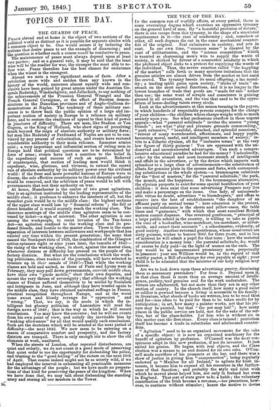TOPICS OF THE DAY.
THE GUARDS OF PEACE.
Pne.cn abroad and at home is the object of two sections of the political world as distinct as it is possible for separate circles with a common object to be. One would secure it by inducing the nations that desireto set the example of disarming ; and the question is whereare:uch a course would be conducive to peace. The maintenance of peace must always depend upon at least two parties; and as a general rule, it may be said that the least wise will be the readier for war, the stronger the most able to re- fuse war. Peace therefore has the best chance for endurance when the wisest is the strongest.
Abroad we note a very significant series of facts. After a revolution more wide and sudden than any known in the history of the world, successes almost equally wide and con- clusive have been gained by great armies under the Austrian Ge- nerals Radetzky, Windischgriitz, and Jellachich, to say nothing of the achievements of the Prussian General Wrangel and the French General Cavaignac, or the effect of Russian demon- strations in the Danubian provinces and of Anglo-Gallican de- monstrations at Naples. The tendency of these military suc- cesses is to throw back the public opinion of a large and im- portant section of society in Europe to a reliance on military force, and to restore the readiness of appeal to that kind of power in junctures of difficulty. There are men, like Stadion or Von Gagern, or the King of Holland, who show signs of perceiving much beyond the reign of absolute authority or military force ; but men like Radetzlcy or Ferdinand of Naples are not to be con- vinced by any process of ratiocination, and events have restored considerable authority to their main reliance. Immense armies exist ; a very important and influential section of ruling men in Europe hold that political questions are to be determined by force of arms ; events have lent a sanction to the belief in the expediency and success of such an appeal. Relieved of counterpoise, that section of leading men would think it expedient, wise, glorious, and virtuous, to extend the sacred rule of absolute authority by its military power over the civilized world: if the freer and more powerful nations of Europe were to disarm, the sole effective counterpoise to the old despotic authority would be removed, and the arbitrium of peace would be left with governments that rest their authority on war.
At home, Manchester is the centre of two great agitations. One is an agitation instituted by the leading representative of the middle class ;, it professes to subserve the interests of all, but the manifest gain would be to the middle class: the highest sections of the upper class would lose by "financial reform "; the full or direct benefits of it would scarcely reach the working class. The immense meetings of the middle class agitators seem to be con- vened by ticket—a sign of mistrust. The other agitation is one among the workpeople, to resist invasion of the Ten-hours Act—an agitation confined to the working class and its pro- fessed friends, and hostile to the master class. There is the same separation of interests between millowners and workpeople that has existed any time within the present generation; the same that caused the Stockport riots of 1829, the combination of the Glasgow cotton-spinners eight or nine years later, the tumults of 1842— the rising of the working class, in short, against the master class, whenever distress or difficulty has pressed on the people of the factory districts. But what are the conclusions which the work- ing politicians, close readers of the journals, will have selected to treasure up in their annals of 1848 ?—That while the working classes are bold and united, as those of Paris and Lyons were in February, they may pull down governments, override middle class, have their own "garde mobile," elect their own deputies, and mount the very throne of sovereignty ; that although the working classes of France suffered themselves to be misled by Socialists and intriguers in June, and although they have trusted again to the middle class, they have obtained universal suffrage in France, practical recognition throughout Europe, and at the worst some sweet and bloody revenge for " oppression " and " wrong!' That, we say, is the mode in which the in- telligent but gloomy politician of Lancashire will read the foreign news of 1848; that is the way in which he will record conclusions. You may know the converse ; but he will see events from his own point of view, and satisfy the inevitable bias by "making allowances" for all that would qualify such conclusions. Such are the doctrines which will be uttered at the next period of difficulty—the next 1842. We now seem to be entering on a season of comparative comfort and prosperity, and the factory districts are tranquil. There is only enough stir to show the old elements at work, unaltered.
When the streets of London, after repeated disturbances, are quiet and orderly, we do not count it a good mode of preserving that quiet order to use the opportunity for disbanding the police, and trusting to the "good feeling" of the rioters on the next 10th of April. That course indeed might not be so utterly wild, if we
had employed the interval in exhausting all practicable measures for the advantage of the people ; but we have made no prepara- tions of that kind for preserving the peace of the kingdom. When we have done that, we may talk about disbanding the standing army and storing all our muskets in the Tower.


























 Previous page
Previous page